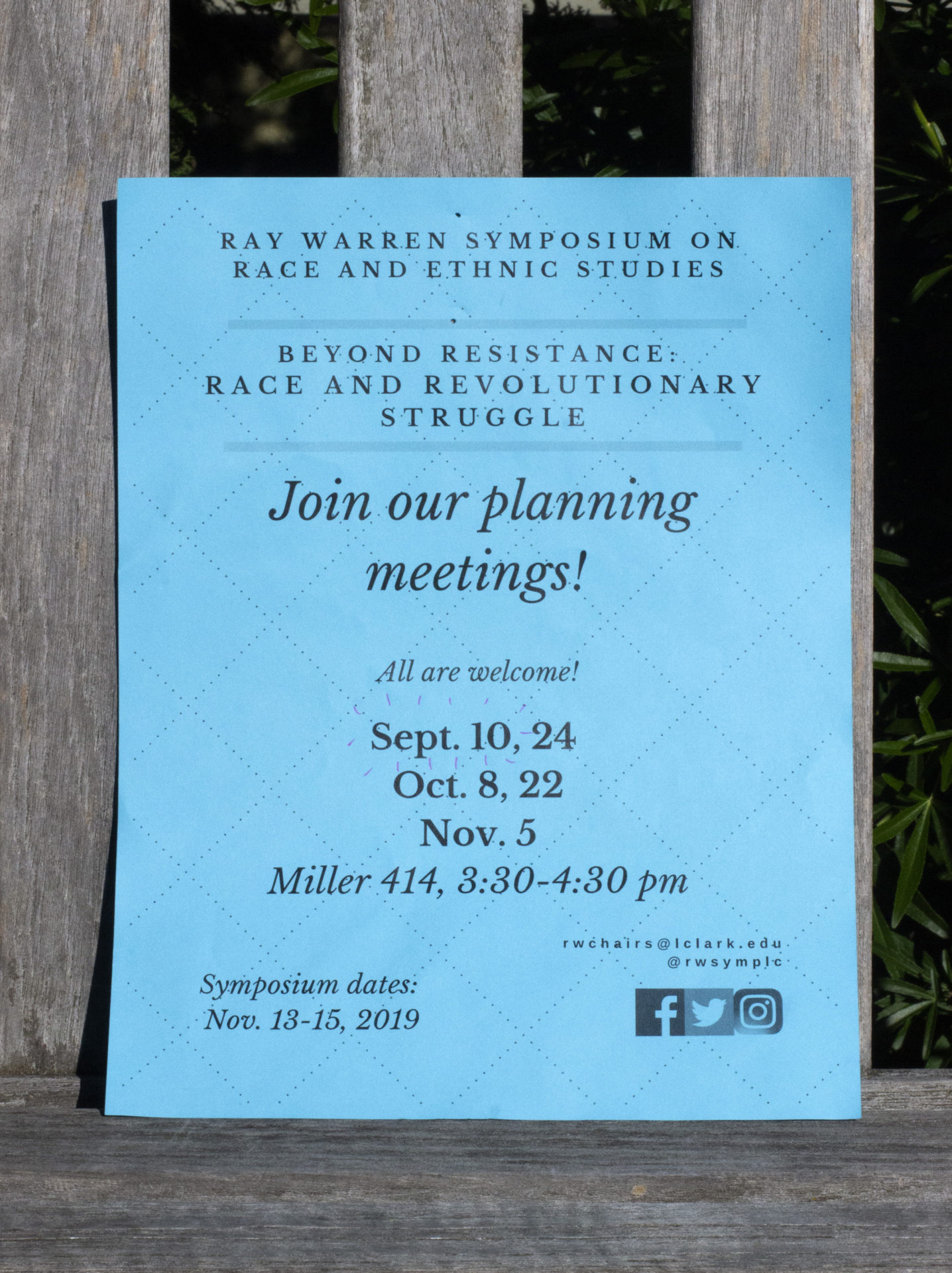
The 16th Annual Ray Warren Symposium on Race and Ethnic Studies will be held from Nov. 13 to Nov. 16. The theme of this year’s symposium is Beyond Resistance: Race and Revolutionary Struggle. The theme falls at the intersection of many topics that the student co-chairs were interested in highlighting during the symposium, including decolonization, environmental justice and art as revolution.
For student Cochair Arunima Singh Jamwal ’20, the theme of revolution represents how people sustain a movement beyond a single event.
“When I think about what revolutionary struggle really means for me, I see it as us trying to gain a deeper understanding of what are the ways in which marginalized communities, especially communities of color … move beyond this one flashpoint of resistance,” Singh Jamwal said. “What we really wanted to do was get ourselves to think about how are these people in their chosen sphere, whether that’s economic, social, or otherwise, how do they continue changing people’s beliefs or changing policies about the issue that they have chosen to work on? How do they sustain that work?”
Singh Jamwal and the other cochairs wanted to ground this broad theme of revolution in people’s personal experiences.
“The struggle part of (the theme) kind of speaks to how personal it is for people,” Singh Jamwal said. “I think that’s really important to acknowledge for us in an academic setting … All of the cochairs and I were very mindful and certain that we wanted this to be an intersection of (the presenters’) professional and personal experiences, so this is not divorced from the everyday realities that they have to face (and) the injustices that they have to face.”
The symposium is an interdisciplinary event, featuring areas of study ranging from environmentalism to art to economics. This interdisciplinary focus is reflected in the variety of events that make up the symposium, including a historical installation in Watzek Library and an art exhibition in Stamm Dining Hall.
“The Watzek library exhibit is curated by two student presenters (Emma Celebrezze ’20 and Ashley O’Leary ’22) and is more historically focused,” Singh Jamwal said. “The art show is submissions from mostly students but just community members in general, and that is curated by two wonderful amazing seniors (Cassidy Keyes ’20 and Emma Ray-Wong ’20). They are going to set up that show in Stamm and it’s going to stay there for the entirety of the symposium, all three days.”
The keynote speakers on Nov. 13 are the U.S. Youth Climate Strike’s National Creative Director Feliquan Charlemagne, and Co-Founder and Co-Executive Director Isra Hirsi. Singh Jamwal is excited for Charlemagne and Hirsi to talk about the intersection of environmentalism and racial issues.
“They speak so eloquently and with such richness about real issues that front-line communities are facing,” Singh Jamwal said. “That is supplemented by the fact that they have lived through climate disasters and seen how racial segregation is connected to environemntal justice.”
As youth activists, Singh Jamwal believes that Charlemagne and Hirsi present a unique perspective that will add to the discussion.
“Even if our policy makers are falling incredibly and disappointingly short of taking the legislative action that we know we need to take at an international level, we as young people can start this conversation in our own communities and in communities all across the country,” Singh Jamwal said. “(Charlemagne and Hirsi) have really harnessed the power of social media to do that, which is another thing that I am excited to hear them speak about … I think that they have something really unique that they can share with us and hopefully we can learn from them.”
Alongside the keynote presentations on Nov. 13 and Nov. 14, panels will be held throughout the symposium that will discuss a variety of topics. Singh Jamwal believes that these panels are an important part of the symposium since their interdisciplinary nature means that anyone will be able to find a panel that they will be interested in.
“I think that the panels are really the meat of the symposium,” Singh Jamwal said. “I think the best part about this symposium is how interdisciplinary we have been able to make it and how many people it can reach.”
For instance, on Nov. 14 the Roots and Homelands panel focuses on the intersection of culture, land and politics.
“(The Roots and Homelands panel) is about our cultures of origin, where we come from, our homelands, and our roots and how our roots nourish the revolutionary work that we do,” Singh Jamwal said. “It’s very much about creating a space for personal and familial stories, so we have a child-mother duo coming in who are both activists, climate and education respectively. We also want to encourage scholarly reflections on land and politics, so we have Anand Vaidya, who is a professor of anthropology at Reed (College), who is going to talk (about) communal movements in relation to land in South Asia.”
Singh Jamwal participated in the symposium’s Race Monologues before becoming a cochair. Their experience with the symposium was impactful, and they wanted to help contribute to creating the space that the symposium offers.
“I participated in (the Race Monologues) as a first year, and it was incredibly moving for me to experience that and to have the honor to be witness to these people’s experiences,” Singh Jamwal said. “I think it’s my view that the Ray Warren Symposium is one of the few spaces on our campus that is really able to have an in-depth and sustained conversation over the course of three days about racial injustices and power dynamics that we come into contact with in our everyday lives.”
Subscribe to the Mossy Log Newsletter
Stay up to date with the goings-on at Lewis & Clark! Get the top stories or your favorite section delivered to your inbox whenever we release a new issue.

Leave a Reply